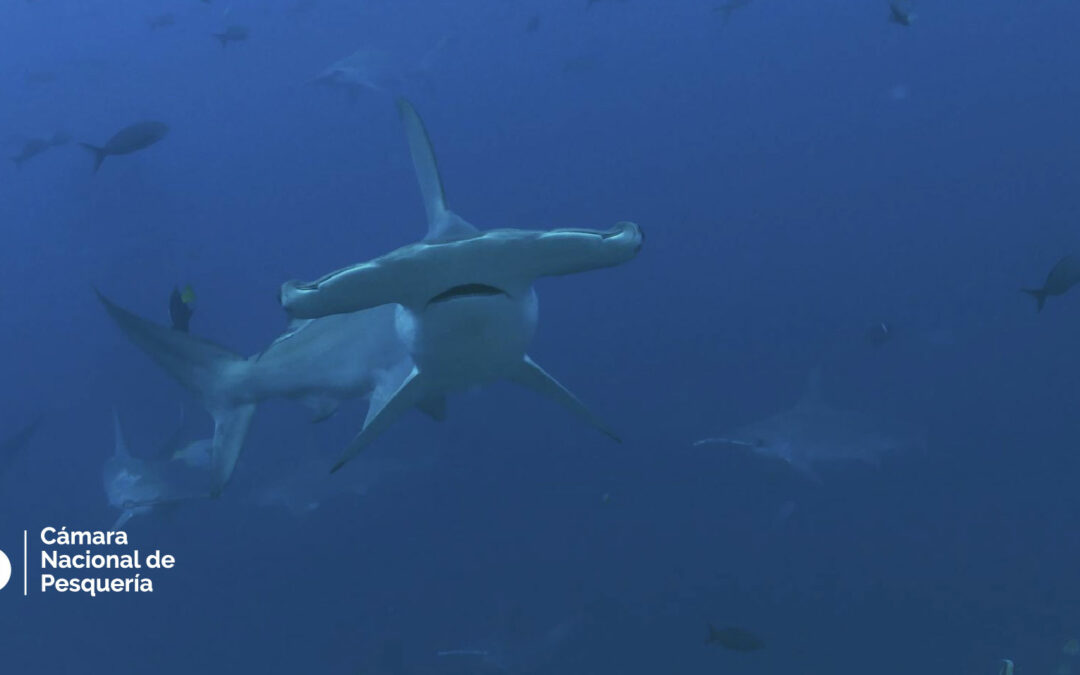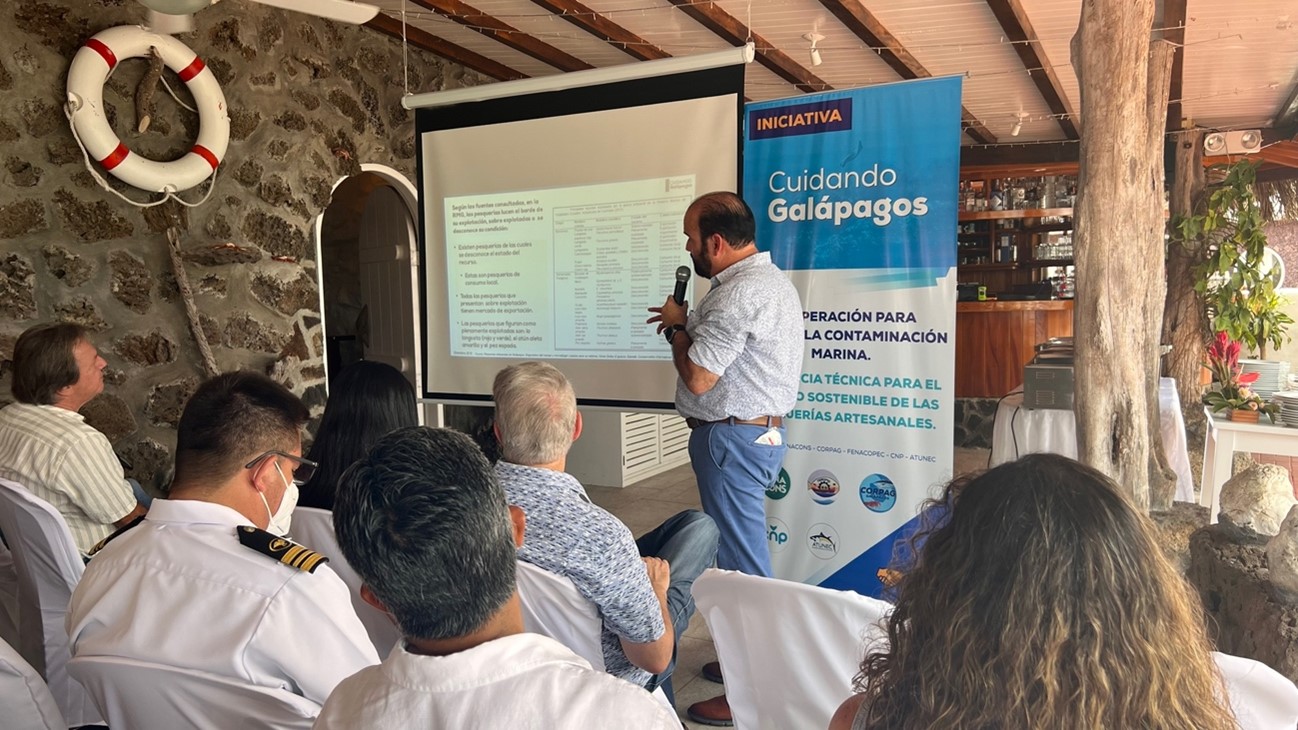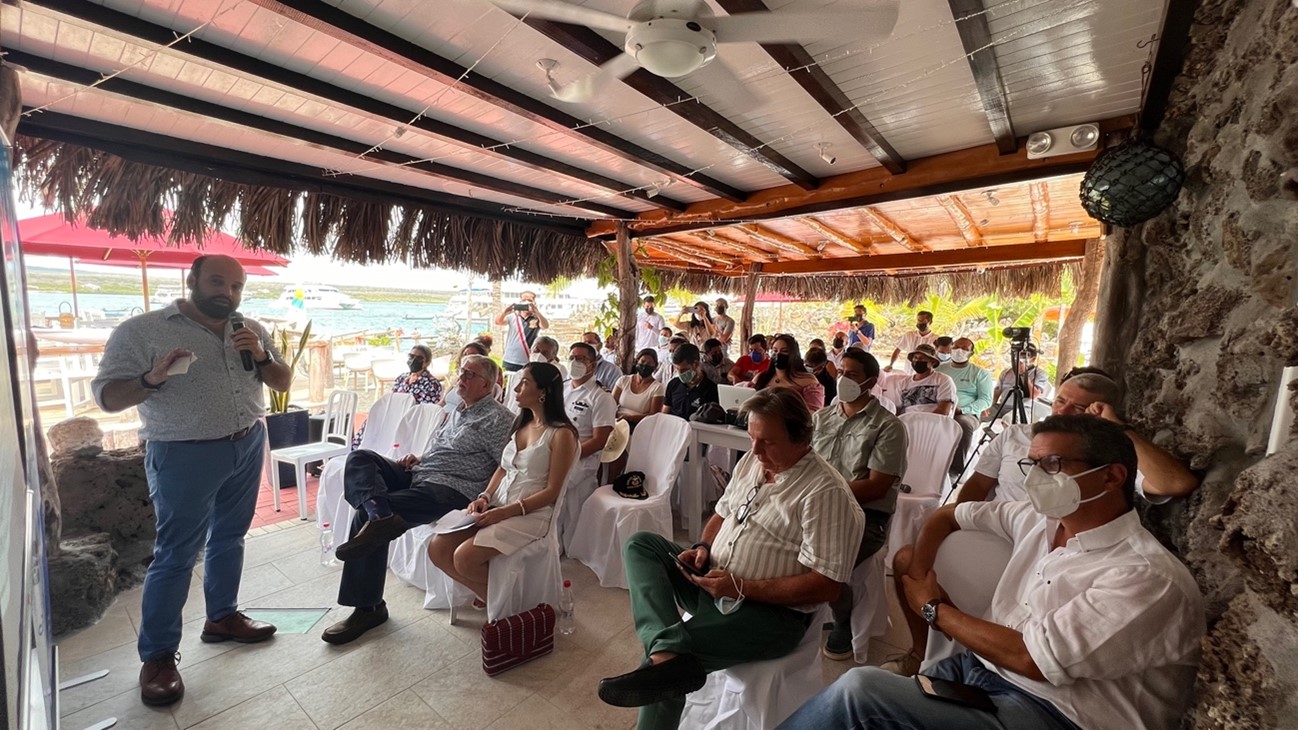Feb 23, 2022 | Blog
El día sábado 19 de febrero se realizó en Puerto Ayora, Santa Cruz el lanzamiento de la iniciativa «Cuidando Galápagos» fruto del Memorandum de entendimiento para la cooperación que se firmó en la 3ra Cumbre Pesquera del Ecuador.
Los impulsadores y gestores del plan son:
Fundación para la pesca sostenible de atún TUNACONS,
Corporación de Pescadores Artesanales de Galápagos CORPAG,
Federación de Cooperativas y Organizaciones Pesqueras Artesanales del Ecuador FENACOPEC,
Cámara Nacional de Pesquerías CNP, y
Asociación de Armadores del Ecuador ATUNEC

El plan de acción de la iniciativa contempla 3 ejes principales,
1) Recolección de plantados para evitar afectar zonas costeras a las Islas
2) Recolección de basura en fondos marinos
3) Desarrollo de proyectos de mejora pesquera (FIPs) en pesquerías artesanales de Galápagos.
A pesar de que la incidencia de plantados que llegan a las costas de las Islas Galápagos es mínima, siendo menos del 1% de los plantados de la flota ecuatoriana, lo que se pretende con este proyecto es reducir su presencia por completo.
El proceso de comunicación será desde el capitán del barco atunero ecuatoriano, porque el 100% de los buques atuneros del ecuador está cooperando con esta iniciativa. El capitán notifica a su jefe de flota y este a su vez al coordinador del proyecto en Galápagos, quién coordinara con las Cooperativas pesqueras artesanales de Galápagos para movilizar una lancha que hará el levantamiento del plantado para llevarlo a tierra donde sus materiales serán clasificados en reciclables y desechados.
El mecanismo de esta iniciativa de TUNACONS junto con CNP y ATUNEC y los gremios pesqueros artesanales de Galápagos es pionera en el mundo porque genera una alianza entre dos sectores de la pesca, esta acción en Ecuador abre camino para que otras pesquerías en otras partes del mundo puedan desarrollarlo también.
Respecto a la recolección de basura en fondos marinos en la reserva marina, es otro ejemplo de apoyo para reducir de contaminación, que es hoy en día la principal amenaza de todos los océanos como lo destaca una investigación publicada en Nature Sustainability, que proporciona el primer diagnóstico global integrado sobre el origen y composición de la basura vertida en el océano.

En la superficie del mar los plásticos son el 95% de los desechos. Así lo indica un nuevo estudio de escala mundial que pone cifras a la composición de la basura marina. El plástico es, de lejos, el material dominante en los océanos. El problema está perfectamente diagnosticado. El grueso de la contaminación lo causan las bolsas de un solo uso, las botellas, los envases de comida y los envoltorios alimentarios (Artículo de lavanguardia.com). El proceso en esta acción será realizar brigadas periódicas de buzos para recoger la basura marina costera que posteriormente será reciclada o desechada según amerite.
El eje de asesorías técnicas para los pescadores artesanales se enfocará en el diseñar e implementar «Proyectos de Mejora pesquera» abreviados FIPs por sus siglas en inglés. Que les permitirá tener un diagnóstico claro y actualizado de la situación actual de la especie objetivo de su pesca a través de una preevaluación de la pesquería, posteriormente se traza un plan de acción que deben implementar los pescadores para alcanzar una certificación de pesca sostenible que dará un valor agregado y abrirá mercados internacionales a los pescadores locales.

El sector pesquero nacional se ha unido para colaborar en el cuidado de Galápagos y sus zonas marinas como otro acto de responsabilidad con este tesoro de la humanidad.
El evento fue transmitido en directo por las redes sociales de TUNACONS y el Media Partner Azul Sostenible. En el video de YouTube del evento, se puede ver la transmisión en español y por configuración automática se puede poner subtítulos en cualquier idioma. https://www.youtube.com/watch?v=C5VmxMR9R38&t=21s
Para más información de la cooperación entre gremios pesqueros y acciones sostenibles en las Islas Galápagos, les invitamos a revisar nuestra web oficial.
https://tunacons.org/galapagos-cooperation/Presentación del Plan de acción
On Saturday, February 19, the “Caring for Galapagos” initiative was launched in Puerto Ayora, Santa Cruz, as a result of the Memorandum of Understanding for cooperation signed at the 3rd Ecuadorian Fisheries Summit.
The promoters and managers of the plan are:
Foundation for Sustainable Tuna Fishing TUNACONS,
Corporation of Artisanal Fishermen of Galapagos CORPAG,
Federation of Artisanal Fishing Cooperatives and Organizations of Ecuador FENACOPEC,
National Chamber of Fisheries CNP, and
Ecuadorian Shipowners Association ATUNEC
The plan of action of the initiative includes 3 main axes,
1) Collection of FADs to avoid affecting the coastal areas of the islands.
2) Collection of garbage on the seabed.
3) Development of fishery improvement projects (FIPs) in artisanal fisheries in Galapagos.
Although the incidence of FADs arriving off the coast of the Galapagos Islands is minimal, being less than 1% of the FADs in the Ecuadorian fleet, the aim of this project is to reduce their presence completely.
The communication process will be from the captain of the Ecuadorian tuna vessel, because 100% of the Ecuadorian tuna vessels are cooperating with this initiative. The captain notifies his fleet manager, who in turn notifies the project coordinator in Galapagos, who will coordinate with the Galapagos artisanal fishing cooperatives to mobilize a boat that will lift the FADs and take them to land where their materials will be sorted into recyclable and discarded.
The mechanism of this initiative of TUNACONS together with CNP and ATUNEC and the artisanal fishing guilds of Galapagos is a pioneer in the world because it generates an alliance between two fishing sectors, this action in Ecuador opens the way for other fisheries in other parts of the world to develop it as well.
Regarding the collection of garbage on the seabed in the marine reserve, it is another example of support to reduce pollution, which is today the main threat to all oceans, as highlighted by research published in Nature Sustainability, which provides the first integrated global diagnosis of the origin and composition of garbage dumped in the ocean.
At the surface of the sea, plastics account for 95% of the debris. This is according to a new global study that puts figures on the composition of marine litter. Plastic is by far the dominant material in the oceans. The problem is well diagnosed. The bulk of the pollution is caused by single-use bags, bottles, food packaging and food wrappings (Article from lavanguardia.com). The process in this action will be to carry out periodic brigades of divers to collect the coastal marine garbage that will later be recycled or disposed of as appropriate.
The axis of technical advice for artisanal fishermen will focus on designing and implementing “Fisheries Improvement Projects” abbreviated FIPs for its acronym in English. This will allow them to have a clear and updated diagnosis of the current situation of the target species of their fishery through a pre-assessment of the fishery, then a plan of action to be implemented by the fishermen to achieve a sustainable fishing certification that will add value and open international markets to local fishermen.
The national fishing sector has united to collaborate in the care of Galapagos and its marine areas as another act of responsibility towards this treasure of humanity.
The event was broadcast live on the social networks of TUNACONS and Media Partner Azul Sostenible. In the YouTube video of the event, you can see the transmission in Spanish and by automatic configuration you can put subtitles in any language. https://www.youtube.com/watch?v=C5VmxMR9R38&t=21s
For more information on cooperation between fishing guilds and sustainable actions in the Galapagos Islands, we invite you to review our official website.


3 Comments
The point of view of your article has taught me a lot, and I already know how to improve the paper on gate.oi, thank you. https://www.gate.io/ru/signup/XwNAU
Its like you read my mind! You appear to know a lot about this, like you wrote the book in it or something.
I think that you can do with a few pics to drive the message home
a little bit, but instead of that, this is fantastic blog.
A fantastic read. I’ll definitely be back.
Những app vay tiền bị bắt thường có rất nhiều thủ đoạn khác nhau nhằm lừa đảo khách hàng. Các app vay tiền online này thường núp bóng tín dụng đen trên thị trường. Mới đây, Phòng cảnh sát hình sự (PC02) Công an TP.HCM đã triệt phá một đường dây cho vay nặng lãi thông qua các ứng dụng cho vay tiền nhanh do người Trung Quốc cầm đầu, cho vay tiền thông qua các ứng dụng trên điện thoại như Vaytocdo, Moreloan và VD online. Chỉ từ tháng 4-2019 đến nay, nhóm người Trung Quốc đã cho 60.000 người ở nhiều địa phương vay khoảng 100 tỉ đồng với lãi suất lên đến hơn 1.000% đến 2.000% năm. Trên đây là những thông tin cần thiết về vay tiền nhanh FVay, đừng bỏ qua một app vay tiền tốt nhất như FVay. Những lúc cần khắc phục vấn đề tài chính thì đây là giải pháp tốt nhất cho bạn.
https://www.bookmark-step.win/vay-tien-qua-fe
Tuy nhiên, như đã nói ở trên ACS Việt Nam không cung cấp các dịch vụ cho vay tiền mặt, vì vậy đây đều là những thông tin lừa đảo. Đây là các dịch vụ cho vay tiền online, vay tiền nóng trá hình khách hàng nên cẩn thận khi vay vốn. ACS có cho vay tiền mặt không? RedBag xin khẳng định thêm một lần rằng công ty này không cho vay tiền mặt. Các thông tin hướng dẫn vay tiền mặt ACS đều không đúng và có dấu hiệu lừa đảo, bạn đọc cần hết sức cẩn trọng. Vì ACS là một công ty có vốn đầu tư lớn từ Nhật Bản và đã trải qua nhiều năm phát triển. Nên mọi thông tin chính sách và điều khoản đều mang tính minh bạch và công khai. Nhân viên luôn hỗ trợ nhiệt tình và chu đáo giúp khách hàng hiểu rõ hơn về các sản phẩm của ACS. Vậy nên bạn hãy yên tâm vay tiền mặt tại ACS nhé!